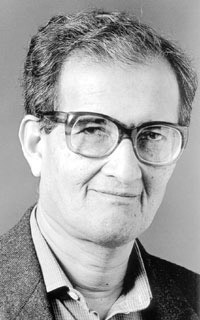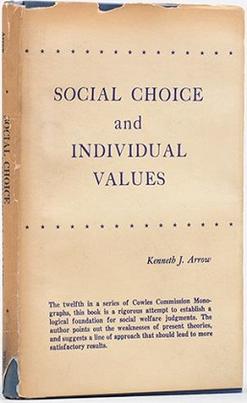Related Research Articles
Economics is a social science that studies the production, distribution, and consumption of goods and services.
Neoclassical economics is an approach to economics in which the production, consumption, and valuation (pricing) of goods and services are observed as driven by the supply and demand model. According to this line of thought, the value of a good or service is determined through a hypothetical maximization of utility by income-constrained individuals and of profits by firms facing production costs and employing available information and factors of production. This approach has often been justified by appealing to rational choice theory.
Pareto efficiency or Pareto optimality is a situation where no action or allocation is available that makes one individual better off without making another worse off. The concept is named after Vilfredo Pareto (1848–1923), Italian civil engineer and economist, who used the concept in his studies of economic efficiency and income distribution. The following three concepts are closely related:

Kenneth Joseph Arrow was an American economist, mathematician, writer, and political theorist. Along with John Hicks, he won the Nobel Memorial Prize in Economic Sciences in 1972.
A Kaldor–Hicks improvement, named for Nicholas Kaldor and John Hicks, is an economic re-allocation of resources among people that captures some of the intuitive appeal of a Pareto improvement, but has less stringent criteria and is hence applicable to more circumstances. A re-allocation is a Kaldor–Hicks improvement if those that are made better off could hypothetically compensate those that are made worse off and lead to a Pareto-improving outcome. The compensation does not actually have to occur and thus, a Kaldor–Hicks improvement can in fact leave some people worse off.
In welfare economics and social choice theory, a social welfare function—also called a socialordering, ranking, utility, or choicefunction—is a function that ranks a set of social states by their desirability. A social welfare function takes two possible outcomes, then combines every person's preferences to determine which outcome is considered better by society as a whole. Inputs to the function can include any variables that affect the well-being of a society.
Welfare economics is a field of economics that applies microeconomic techniques to evaluate the overall well-being (welfare) of a society. This evaluation is typically done at the economy-wide level, and attempts to assess the distribution of resources and opportunities among members of society.
In economics and particularly in consumer choice theory, the substitution effect is one component of the effect of a change in the price of a good upon the amount of that good demanded by a consumer, the other being the income effect.
Allocative efficiency is a state of the economy in which production is aligned with the preferences of consumers and producers; in particular, the set of outputs is chosen so as to maximize the social welfare of society. This is achieved if every produced good or service has a marginal benefit equal to the marginal cost of production.

The liberal paradox, also Sen paradox or Sen's paradox, is a logical paradox proposed by Amartya Sen which shows that no means of aggregating individual preferences into a single, social choice, can simultaneously fulfill the following, seemingly mild conditions:
- The unrestrictedness condition, or U: every possible ranking of each individual's preferences and all outcomes of every possible voting rule will be considered equally,
- The Pareto condition, or P: if everybody individually likes some choice better at the same time, the society in its voting rule as a whole likes it better as well, and
- Liberalism, or L : all individuals in a society must have at least one possibility of choosing differently, so that the social choice under a given voting rule changes as well. That is, as an individual liberal, anyone can exert their freedom of choice at least in some decision with tangible results.
There are two fundamental theorems of welfare economics. The first states that in economic equilibrium, a set of complete markets, with complete information, and in perfect competition, will be Pareto optimal. The requirements for perfect competition are these:
- There are no externalities and each actor has perfect information.
- Firms and consumers take prices as given.
Social choice theory or social choice is a branch of welfare economics that analyzes mechanisms and procedures for collective decision-making. Social choice incorporate insights from economics, mathematics, and game theory to find the best ways to combine individual opinions, preferences, or beliefs into a single coherent measure of the quality of different outcomes, called a social welfare function.
The Scitovsky paradox is a paradox in welfare economics which is resolved by stating that there is no increase in social welfare by a return to the original part of the losers. It is named after the Hungarian born American economist, Tibor Scitovsky.

Kenneth Arrow's monograph Social Choice and Individual Values and a theorem within it created modern social choice theory, a rigorous melding of social ethics and voting theory with an economic flavor. Somewhat formally, the "social choice" in the title refers to Arrow's representation of how social values from the set of individual orderings would be implemented under the constitution. Less formally, each social choice corresponds to the feasible set of laws passed by a "vote" under the constitution even if not every individual voted in favor of all the laws.
In economics, distribution is the way total output, income, or wealth is distributed among individuals or among the factors of production. In general theory and in for example the U.S. National Income and Product Accounts, each unit of output corresponds to a unit of income. One use of national accounts is for classifying factor incomes and measuring their respective shares, as in national Income. But, where focus is on income of persons or households, adjustments to the national accounts or other data sources are frequently used. Here, interest is often on the fraction of income going to the top x percent of households, the next x percent, and so forth, and on the factors that might affect them.
Economic justice is a component of social justice and welfare economics. It is a set of moral and ethical principles for building economic institutions, where the ultimate goal is to create an opportunity for each person to establish a sufficient material foundation upon which to have a dignified, productive, and creative life.."
A lump-sum tax is a special way of taxation, based on a fixed amount, rather than on the real circumstance of the taxed entity. In this, the entity cannot do anything to change their liability.
In social choice theory, unrestricted domain, or universality, is a property of social welfare functions in which all preferences of all voters are allowed. Intuitively, unrestricted domain is a common requirement for social choice functions, and is a condition for Arrow's impossibility theorem.

In game theory, a simultaneous game or static game is a game where each player chooses their action without knowledge of the actions chosen by other players. Simultaneous games contrast with sequential games, which are played by the players taking turns. In other words, both players normally act at the same time in a simultaneous game. Even if the players do not act at the same time, both players are uninformed of each other's move while making their decisions. Normal form representations are usually used for simultaneous games. Given a continuous game, players will have different information sets if the game is simultaneous than if it is sequential because they have less information to act on at each step in the game. For example, in a two player continuous game that is sequential, the second player can act in response to the action taken by the first player. However, this is not possible in a simultaneous game where both players act at the same time.
In economics, and in other social sciences, preference refers to an order by which an agent, while in search of an "optimal choice", ranks alternatives based on their respective utility. Preferences are evaluations that concern matters of value, in relation to practical reasoning. Individual preferences are determined by taste, need, ..., as opposed to price, availability or personal income. Classical economics assumes that people act in their best (rational) interest. In this context, rationality would dictate that, when given a choice, an individual will select an option that maximizes their self-interest. But preferences are not always transitive, both because real humans are far from always being rational and because in some situations preferences can form cycles, in which case there exists no well-defined optimal choice. An example of this is Efron dice.
References
- ↑ Chipman 1987, p. 524.
- ↑ Kaplow 2008.
- ↑ Arrow 1963.